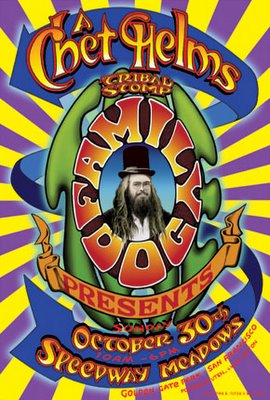
For Immediate Release: 10/14/05
Event: A Chet Helms Tribal Stomp
Produced by: Family Dog
Date: Sunday, October 30th, 2005
Location: Speedway Meadows, Golden Gate Park
Time: 9am to 5:30pm
Admission: Free
Non-Profit: 501 (c) 3
Bands: Jefferson Starship: Paul Kantner, David Frieberg, Pete Sears,
Prairie Prince, Nick Gravenites, Harvey Mandel, Eric Burdon, Dan Hicks
and the Hot Licks, The Charlatans, Country Joe McDonald (Country Joe and The
Fish) The Rowan Brothers, Jerry Miller, Lee Osker (Schedule Permitting) Terry Haggerty and James Preston (Sons of Champlin), Zero II, Roy Rogers, and Ramblin’ Jack Elliott. Cold Blood featuring Lydia Pense, Lee Michaels, Quicksilver Gold, featuring Joli Valenti and Mario Cipollina, Squid B. Vicious, Barry “The Fish” Melton, Blue Cheer, (Dickie Peterson, Leigh Stephens), Jorge Santana, George Michalski, Greg Errico (Sly and the Family Stone), Canned Heat, Narada Michael Walden, Natural Act (Hal Wagenet and Mitchell Holman), Jeff Blackburn, Howard Wales, Richi Ray, (Freedom Highway), Vince Welnick, (The Tubes and Grateful Dead), David Denny (Steve Miller), Peter Kaukonen, Herman Eberitzsch (Lee Oskar), Ross Valory (Journey), Judge Murphy, Stephen Gaskin, Howard Hessman (as schedule permits) Greg Douglass (Steve Miller) Rock Hendricks, Bruce Latimer, David and Linda Laflamme (It's A Beautiful Day), Lydia Pense (Cold Blood), Annie Samson (Stone Ground), and Wavy Gravy.
Chet Helms was one of the founding fathers of the psychedelic movement from the 1960's. As promoter for the "Family Dog", Chet developed the concept of the modern rock concert and was one of the founding fathers of the 1960's peace movement that swept the nation and made waves around the world. Chet was also the catalyst that brought together Janis Joplin with Big Brother and the Holding Company, which helped shape the San Francisco sound. Without Chet Helms, as many have said, there would be no Grateful Dead, no Jefferson Airplane, no Big Brother and the list goes on and on. He promoted other acts such as the Charlatans, the Great Society, Jimi Hendrix, The Doors, Peter Tosh, The Clash and countless others. Chet Helms continued promoting pivotal concerts through four decades. In the 60's at the Avalon Ballroom, Family Dog at the Beach, S.F. Golden Gate Park, Denver Dog, and Crystal Ballroom in Portland.










